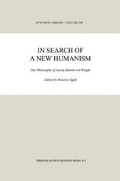Abstract
Professor von Wright is a prominent analytical philosopher who has written about the very notion of analytical philosophy. Other analytical philosophers are present here and they have their ideas on this notion. As for me, I believe that it is not at all an obvious notion. Sometimes it seemed to me that analytical philosophy does not exist, or at least that there is no single common philosophical feature shared by all so-called analytical philosophers and only by them, though there are many family resemblances. Therefore I thought I might take the opportunity of this meeting in honour of Professor von Wright and propose as one of our themes for discussion, precisely the question: “what is analytical philosophy?”. The natural start is Professor von Wright’s description of analytical philosophy.
Access this chapter
Tax calculation will be finalised at checkout
Purchases are for personal use only
Preview
Unable to display preview. Download preview PDF.
Notes
G. H. von Wright: Explanation and Understanding, Routledge and Kegan Paul, London, 1971, p. 9. See also his later paper “Analytische Philosophie. Eine historisch-kritische Betrachtung”, Rechtstheorie“, 23, 1992, pp. 3–25; reprinted in English translation in G. H. von Wright: The Tree of Knowledge and Other Essays, E. J. Brill, Leiden 1993.
Ibidem.
G. H. von Wright: “Wittgenstein and the Twentieth Century”, in R. Egidi (ed.): Wittgenstein: Mind and Language, Kluwer, Dordrecht 1995.
Ibidem.
G. H. von Wright: Problems and Prospects in Deontic Logic. A Survey“, in E. Agazzi (ed.): Modern Logic, Reidel, Dordrecht 1980, p. 399. Cfr. also ”Intellectual Autobiography“, in P. A. Schilpp and L. E. Hahn (eds.): The Philosophy of G. H. von Wright, Open Court, La Salle, Ill. 1989, p. 50.
K. Segerberg: “Getting Started: Beginnings in the Logic of Action”, in G. Corsi, C. Mangione, M. Mugnai (eds.): Atti del Convegno Internazionale di Storia della Logica: Le teorie della modalità, Clueb, Bologna 1989, p. 221.
G. H. von Wright: “Intellectual Autobiography”, cit., p. 46.
G. H. von Wright: “Time, Change and Contradiction”, in G. H. von Wright: Philosophical Logic. Philosophical Papers, Vol. II, Blackwell, Oxford 1983, p. 115.
N. Goodman: Fact, Fiction, and Forecast,Bobbs Merrill, Indianapolis, New York-Kansas City, 1955, 19652.
J. Rawls: A Theory of Justice, Oxford University Press, Oxford 1971.
D. Prawitz: ‘Meaning and Proofs: on the Conflict between Classical and Intuitionistic Logic“, Theoria, 43, 1977, pp. 1–40.
Cfr. C. Cellucci: “From Closed to Open Systems”, in J. Czermak (ed.): Philosophy of Mathematics, Hölder-Pichler-Tempsky, Wien 1993, pp. 206–20.
Cfr. G. H. von Wright: “Intellectual Autobiography”, cit., p. 49.
Ibidem
Ibidem,p. 53.
Quoted by R. Haller: “Wittgenstein and Austrian Philosophy”, in J. C. Nyiri: Austrian Philosophy: Studies and Texts, Philosophia Verlag, München 1981.
W. V. O. Quine: “Epistemology Naturalized”, in W. V. O. Quine: Ontological Relativity and Other Essays, Columbia University Press, New York-London 1969, pp. 69–90.
W. V. O. Quine: “Five Milestones of Empiricism”, in W. V. O. Quine: Theories and Things, Harvard University Press, Cambridge, p. 72.
Cfr. P. Kitcher: ‘The Naturalists Return“, Philosophical Review, 101, 1992, pp. 53–114.
M. Dummett: “Can Analytical Philosophy be Systematic, and Ought it to Be?”, now in Truth and Other Enigmas, Duckworth, London 1978, p. 441.
M. Dummett: Origins of Analytical Philosophy, Duckworth, London 1993, p. 4, cfr. M. Dummett: The Logical Basis of Metaphysics, Duckworth, London 1991, p. 3.
Note added in November 1997]One year after presenting this paper at the Rome Colloquium on Professor von Wright’s philosophy I happened to read Fabrice Pataut’s interesting ‘Interview with Michael Dummett“ in Philosophical Investigations,19, 1996, pp. 1–33, where Dummett (interviewed by Pataut in 1992) seems to come to a similar conclusion and thus seems to abandon the view that (1) is essential to analytical philosophy. In this interview Dummen emphasizes another characteristic feature of analytical philosophers, which persists even when they, like Gareth Evans or Cristopher Peacocke, deny the priority of language over thought: ‘I think the big difference between analytic philosophers and others is probably that all analytic philosophers assume something resembling the kind of semantics that underlies mathematical logic, i.e. Fregean semantics. Not necessarily in all the details, but they nevertheless assume some such structure, where the components of sentences or the components of thoughts [chrw(133)] contribute to the semantic value of complete sentences or complete thoughts. The contribution is something that goes towards fixing their truth or assertibility” (ibidem,p. 18). Dummett acknowledges that this idea is “very vague and it might be difficult to apply it to some of the ordinary language philosophers”.
R. Rorty: Philosophy and the Mirror of Nature, Princeton University Press, Princeton 1979, p. 139.
Cfr. H. Field: Realism, Mathematics and Modality, Blackwell, Oxford 1989.
Cfr. P. Maddy: Realism in Mathematics, Clarendon Press, Oxford 1990.
Cfr. H. Putnam: “Mathematics without Foundations”, The Journal of Philosophy, 64, n. 1, 1967, pp. 5–22. Putnam criticizes also naturalized philosophy: cfr. “Why There Isn’t a Ready Made World”, Synthese, 51, n. 2, 1982, pp. 141–67 and ‘Why Reason Can’t Be Naturalized“, Synthese, 52, n. 1, 1982, pp. 3–23.
If you are curious about non-foundational theories of meaning, you can find a detailed description of a systematic theory of this kind in my dissertation: cfr. C. Cozzo: Meaning and Argument, Almqvist and Wiksell, Stockholm 1994.
Author information
Authors and Affiliations
Editor information
Editors and Affiliations
Rights and permissions
Copyright information
© 1999 Springer Science+Business Media Dordrecht
About this chapter
Cite this chapter
Cozzo, C. (1999). What is Analytical Philosophy?. In: Egidi, R. (eds) In Search of a New Humanism. Synthese Library, vol 282. Springer, Dordrecht. https://doi.org/10.1007/978-94-017-1852-3_4
Download citation
DOI: https://doi.org/10.1007/978-94-017-1852-3_4
Publisher Name: Springer, Dordrecht
Print ISBN: 978-90-481-5260-5
Online ISBN: 978-94-017-1852-3
eBook Packages: Springer Book Archive

